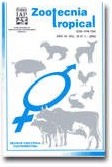
|
Zootecnia Tropical
Instituto Nacional de Investigaciones Agrícolas Venezuela
ISSN: 0798-7269
Vol. 28, No. 2, 2010, pp. 239-254
|
 Bioline Code: zt10025
Bioline Code: zt10025
Full paper language: English
Document type: Research Article
Document available free of charge
|
|
|
Zootecnia Tropical, Vol. 28, No. 2, 2010, pp. 239-254
| es |
Crecimiento y sobrevivencia de la ostra de mangle Crassostrea rhizophorae  bajo condición de cultivo intermareal y submareal bajo condición de cultivo intermareal y submareal
Nuñez, Maximiano P.; Lodeiros, César; Ramirez, Enmary; Narváez, Noelis & Graziani, César
Resumen
Se evaluó el crecimiento y la supervivencia de Crassostrea rhizophorae

en régimen de cultivo submareal e
intermareal en la laguna Grande del Obispo, Golfo de Cariaco, estado Sucre, Venezuela, se colocaron semillas
de 32-35 mm de longitud dorso-ventral de la concha en cestos mantenidos en parques fijos. Se comparó el
crecimiento de las ostras en longitud, biomasa seca, masa de la concha y la supervivencia en los dos sistemas de
cultivo, en dos períodos: el primero (I), de octubre 2005 a enero 2006 y el segundo (II) de febrero a septiembre
de 2006. Se tomaron los parámetros ambientales: temperatura, salinidad, clorofila a, seston, biofouling y
pluviosidad, en función de relacionarlos con la variabilidad del crecimiento y la supervivencia. En los primeros
meses, para ambos períodos, se obtuvó una elevada y progresiva mortalidad en el sistema de cultivo submareal,
relacionada con la presencia del gasterópodo Cymatium poulsenii

. Por el contrario, las ostras en condiciones
intermareal tuvieron una supervivencia superior a 95 % en ambos períodos. El crecimiento en talla y biomasa no
mostró diferencias significativas en los primeros meses entre sistemas, en el período I los organismos submareal
e intermareal alcanzaron tallas de 43,3±3,43 y 48,2±4,01 al final del ensayo (3 meses). En el período II las
ostras del sistema intermareal alcanzaron los 75,13 ±5,16 mm (incremento de del 108%), durante 7 meses de
cultivo. Los resultados muestran una mayor factibilidad de cultivo intermareal, evitando una elevada incidencia
de predadores, particularmente Cymatium poulsenii.
Crassostrea rhizophorae, cultivo de ostras, cultivo intermareal.
|
| |
| en |
Growth and survival of the oyster of mangrove low Crassostrea rhizophorae  condition of culture intermareal and submareal in the Big Lagoon of the Bishop, Cariaco’s Gulf, Venezuela condition of culture intermareal and submareal in the Big Lagoon of the Bishop, Cariaco’s Gulf, Venezuela
Nuñez, Maximiano P.; Lodeiros, César; Ramirez, Enmary; Narváez, Noelis & Graziani, César
Abstract
To evaluate the growth and the survival rates of the oyster Crassostrea rhizophorae

in a regime of sub-tidal and
inter-tidal culture at Laguna Grande del Obispo, Gulf of Cariaco, Edo. Sucre, Venezuela, seeds of 32-35 mm in
back-ventral length of the shell, were placed in baskets maintained in fixed parks. The oysters growth in length
and dry biomass as well as mass of the shell and the survival rates in two culture systems were compared in
two periods: the first (I), from October 2005 to January 2006, and the second (II) from February to September
of 2006. Environmental parameters of temperature, salinity, a chlorophyll, seston, biofouling and rainfall were
taken, based on relating them to the variability of the growth and the survival rates. During the first months, for
both periods, a high and progressive mortality in the system of subtidal culture was experienced, related to the presence of the Cymatium poulsenii

gastropod. On the contrary, oysters in intertidal conditions had a survival
rate superior to 95 % in both periods. The growth in length and biomass did not show significant differences, in
the first months, between systems; in period I the organisms, both in subtidal and intertidal conditions, reached
sizes of 43,3±3,43 and 48,2 ±4,01 at the end of the test (3 months). In period II oysters of the intertidal system,
reached 75,13 ± 5,16 mm (an increase the some 108%), during seven (7) months of culture. The results show
a greater feasibility of the intertidal culture, the main reason being its avoidance of the incidence of predators,
particularly Cymatium poulsenii.
Crassostrea rhizophorae, culture of oysters, inter-tidal culture.
|
| |
© Copyright 2010 - Zootecnia Tropical
Alternative site location: http://www.sian.inia.gob.ve/repositorio/revistas_ci/ZootecniaTropical/ztindice.htm
|
|
